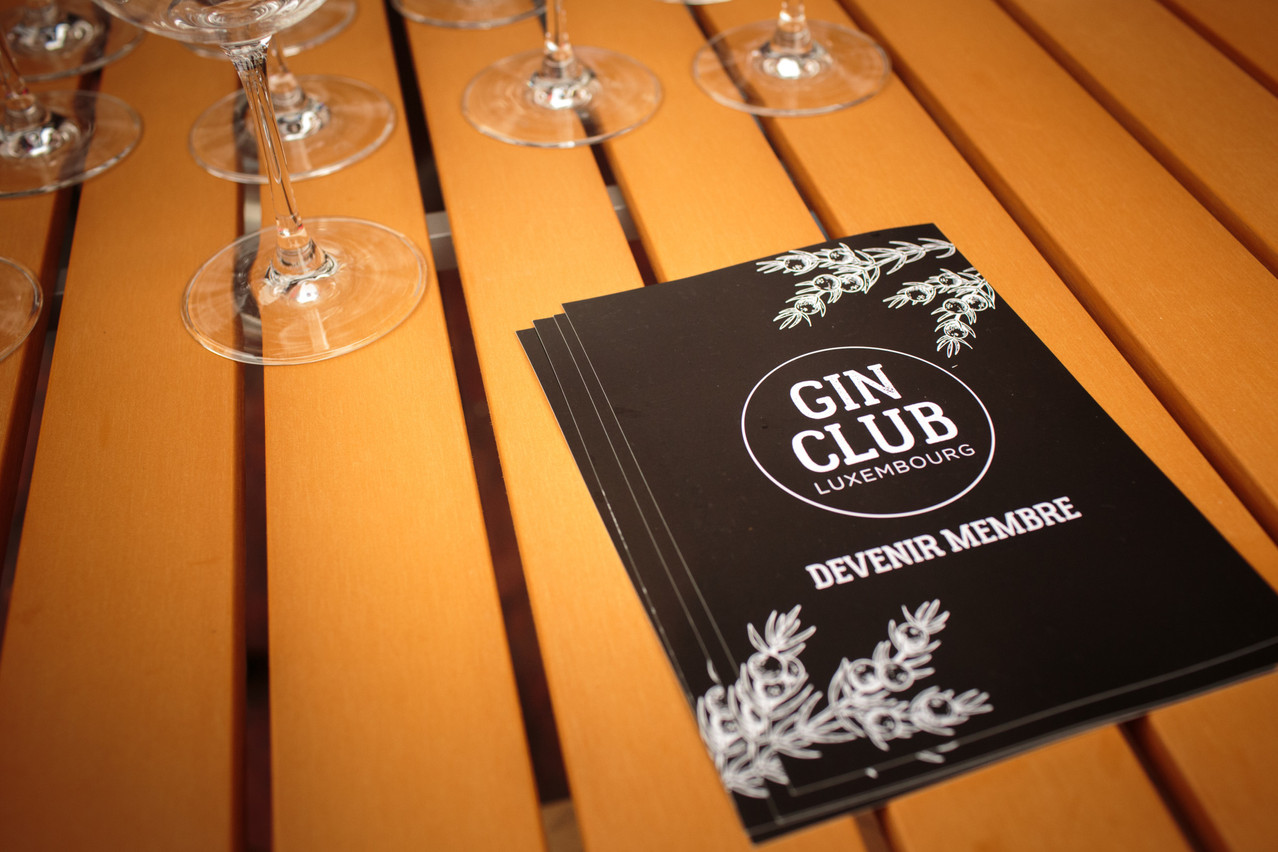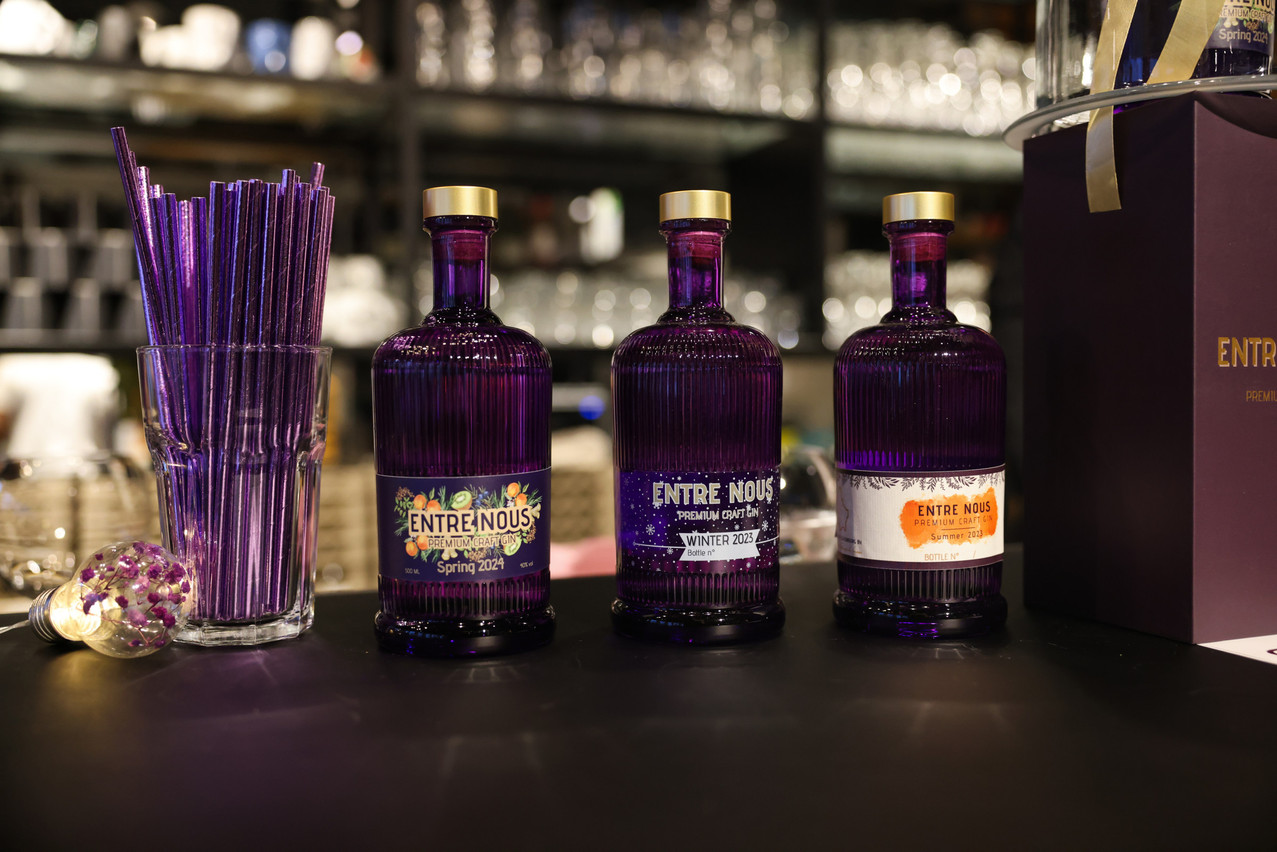Entre Nous Gin, which arrived on the market last year, is a local production of gin founded by Inès Fortemps de Loneux. The young woman of Belgian origin discovered the world of gin during a year spent in Spain, and when she arrived in Luxembourg to work for an audit firm, she visited one distillery after another. The idea was born. She decided to launch her business in February 2022, but due to administrative requirements and authorisations, it was not officially opened until 2023.
As a distillery is a listed establishment, Fortemps de Loneux had to fill in long forms to obtain the necessary authorisations. “The procedures were long, but not complex, and contact with the authorities was direct and clear,” she explains. As a result, the still was ordered and production began. It’s a still that makes her unique. “Many brands outsource their production and don’t take care of the distillation itself.” Fortemps de Loneux therefore produces between 200 and 225 litres of gin for each distillation, which is enough to fill just over 400 bottles.
What I like about gin is that it’s easy to prepare and has an infinite number of possibilities.
Is there any help for setting up your own business? Financially, no. In terms of training, however, Fortemps de Loneux has learned how to create a good business plan, enrolling at the House of Entrepreneurship for support. She currently devotes only 20% of her time to creating gin, but would like to be able to devote part of her time to this activity, depending on sales.
From limited-edition gin to a recurrent version
Fortemps de Loneux has always insisted on using at least one ingredient that she harvests herself in her gin recipes, whether it comes from Luxembourg, Belgium or France (where she owns family land). Recently, she grew lavender in her garden so that she could include it in her new gin recipe. “What I like about gin is that it’s easy to prepare and contains an infinite number of possibilities.” That’s why the young entrepreneur began with limited-edition seasonal gins --Summer, Winter and Spring--in which orange zest and cardamom were sometimes mixed with chilli pepper or basil.
But the need for a recurring gin became apparent, a product that she could offer it to restaurants and bars looking for consistency in the products they offer. The 30-year-old explains that she has secured a partnership with Munhowen, where her gins are sold. Fortemps de Loneux is now working on a recipe with lavender, rosemary and thyme. But she’s not giving up. “I'd like to continue to offer one limited-edition gin per year, for customers who are really looking for unique recipes far removed from London Dry gin, with hand-numbered bottles.”
People don’t just want to buy a product in a shop any more. They want local and original experiences.
It’s a recipe that the community of gin and brand enthusiasts were able to follow and guide. Fortemps de Loneux launched a participatory system to gather outside opinions, and around a hundred people were able to have their say on the final ingredients of the recipe and the labelling. “People are very interested in this kind of experience, they don’t just want to buy a product in a shop. They want local and original experiences. I’d like to develop this and offer events in my distillery in the future.” Her goal for next year? To achieve sales of between €20,000 and €25,000. Fortemps de Loneux’s recurring gin is already available, but it is far from the only one on the market.
In 2024, there were 14 gin producers in Luxembourg, including Mansfeld, Opyos, Gëlle Fra and Tamar. The figures for 2024 end in August, with almost 6,000 litres of gin produced. If production grows evenly, it could reach 9,000 litres by the end of the year. This is less than the previous year, and well below the level for 2021, when more than 20,000 litres of gin were distilled. The consequences of a saturated market?
The sales manager of the Concours Mondial de Bruxelles (CMB), Bruno Sanfilippo, tells us a little more about the popularity of gin in Luxembourg. “Ten years ago, there was a real craze for gin, at a time when spirits such as cognac and grappa were losing ground with younger consumers. Today, the market is stabilising and not all the brands present in Luxembourg will necessarily be able to survive.” Add to that the difficulty of establishing consolidated data on gin production. “A lot of Luxembourg gin is in fact produced abroad, while others are produced in distilleries that do more than just make gin, such as Difrulux, for example.”
This year, around fifteen Luxembourg gins are exhibiting at the CMB in China. Two years ago, Exx Gin was awarded a gold medal.
Awards, yes, but does that mean you can export abroad? “It’s complicated, because there’s a lack of marketing in neighbouring countries. Product development takes place almost exclusively within the country."

The Gin Club Luxembourg organises several evenings a year. Photo: Matic Zorman/Archives
When contacted, , president of Gin Club Luxembourg, notes that gin is still very much in vogue, and new producers are still arriving on the market. The club has around fifty members and keeps a low profile. “We don't do a lot of advertising,” explains Bleser. It organises aperitifs, visits to producers and a few evenings each year with gin presentations.
This article was originally published in .

